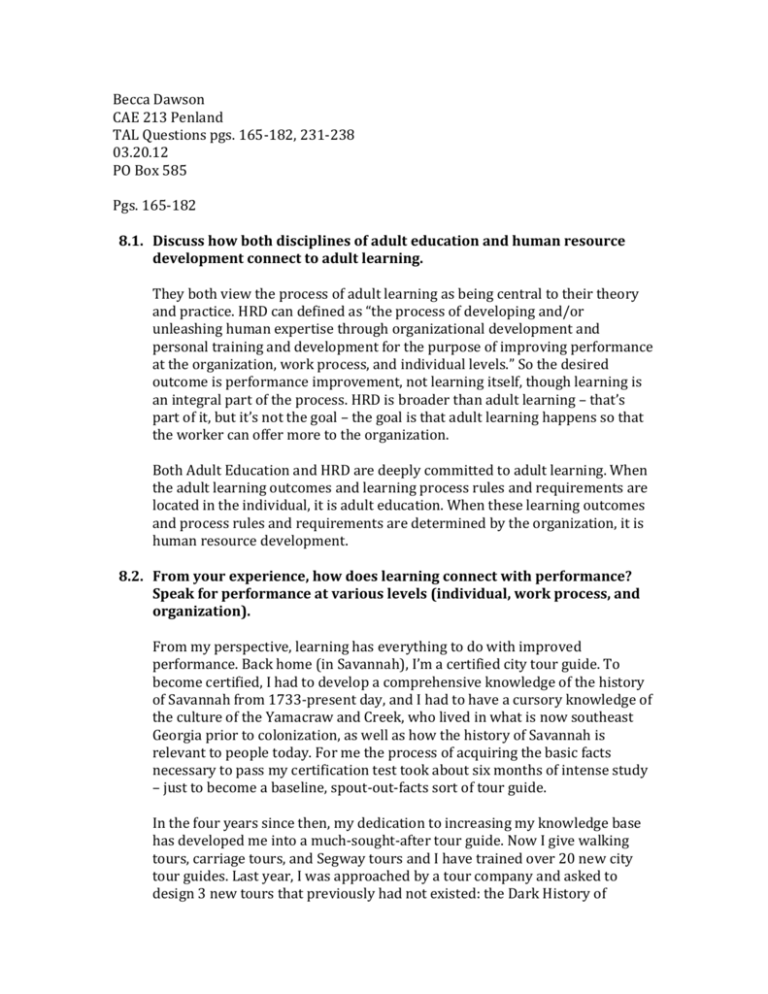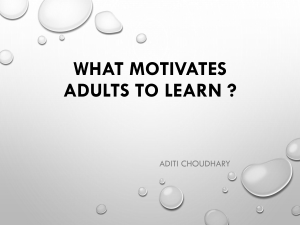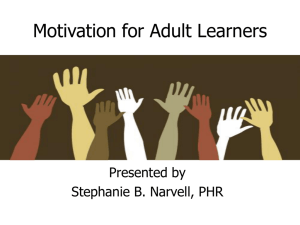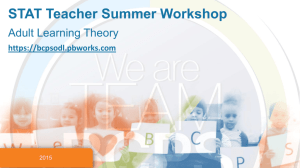Becca Dawson CAE 213 Penland TAL Questions pgs. 165
advertisement

Becca Dawson CAE 213 Penland TAL Questions pgs. 165-182, 231-238 03.20.12 PO Box 585 Pgs. 165-182 8.1. Discuss how both disciplines of adult education and human resource development connect to adult learning. They both view the process of adult learning as being central to their theory and practice. HRD can defined as “the process of developing and/or unleashing human expertise through organizational development and personal training and development for the purpose of improving performance at the organization, work process, and individual levels.” So the desired outcome is performance improvement, not learning itself, though learning is an integral part of the process. HRD is broader than adult learning – that’s part of it, but it’s not the goal – the goal is that adult learning happens so that the worker can offer more to the organization. Both Adult Education and HRD are deeply committed to adult learning. When the adult learning outcomes and learning process rules and requirements are located in the individual, it is adult education. When these learning outcomes and process rules and requirements are determined by the organization, it is human resource development. 8.2. From your experience, how does learning connect with performance? Speak for performance at various levels (individual, work process, and organization). From my perspective, learning has everything to do with improved performance. Back home (in Savannah), I’m a certified city tour guide. To become certified, I had to develop a comprehensive knowledge of the history of Savannah from 1733-present day, and I had to have a cursory knowledge of the culture of the Yamacraw and Creek, who lived in what is now southeast Georgia prior to colonization, as well as how the history of Savannah is relevant to people today. For me the process of acquiring the basic facts necessary to pass my certification test took about six months of intense study – just to become a baseline, spout-out-facts sort of tour guide. In the four years since then, my dedication to increasing my knowledge base has developed me into a much-sought-after tour guide. Now I give walking tours, carriage tours, and Segway tours and I have trained over 20 new city tour guides. Last year, I was approached by a tour company and asked to design 3 new tours that previously had not existed: the Dark History of Savannah (nestled comfortably between regular history and “ghost” – the murders and accidents and such minus the “ghostly” aspect), Morbid Medicines (the medicinal practices often used in the city’s history), and the Pirate History of Savannah (self explanatory – a nautical history of the privateering, smuggling, and blockade running that happened in the history of the city) . In each of these cases, I have had to increase my knowledge base through research and creativity. To use the grid on page 168: On the individual level, I have had to gain expertise, and this goal of gaining expertise has been motivating – the more I learn, the more motivated I become to learn more. I have realized that as I continue to learn, I have increased my capacity to perform on the job, and there are decreased obstacles to my job performance. As I continue to strive to be an excellent tour guide, my goals tend to align with those of my employers – to offer a relevant, interesting, appropriate, accurate, and enjoyable interaction with history, and to do so in a polite, professional, warm, and lively way. I have also seen that process goals become more streamlined – as often, I’m developing my own process. HRD is nonexistent in the tour-guiding world, in my experience. However this is good because then the process becomes exactly what I need it to be – as I seek to learn that which an organization has told me I need to learn for success. Thus as I gain expertise, my process can adapt and change to meet needs, and I can develop a process with the quality and timelessness to continue to perform. I can create a system to use to help future tour guides, and my process goals are designed to meet the goals of the organization. The organizations for which I have worked benefit from increasingly skilled guides, and I have seen that as their guides have striven for excellence, organizational goals grow with the employees in realistic ways. The rewards, policies, and culture increasingly support this desired performance, because it brings in more money. And attempts at more formal HRD are made by leadership so that further improvement can be made. 8.3. What is your general position related to the idea of adult learners controlling their own learning? I’m a huge proponent of the learner completely controlling their own learning. I have seen in my experience that even in matters of HRD, as the learner is motivated, and self directed, the learner will have great success. The most important thing is that the learner has a knowledge of how to access resources for learning, and that the learner has a supportive community in which to share/discuss acquired knowledge. However, if learners are not highly motivated and self-directed individuals, they will not necessarily take control of their own learning. As it relates to HRD, in our world, everyone should be working somewhere they like. They should be interested in what they are doing and seek to learn more always. However, many people are trapped at jobs they dislike, and I believe this is why they oftentimes do not want to take control of their own learning. However this can be convenient for HRD in cases where individual goals do not line up with organizational goals. 8.4. Discuss the relative ease and difficulty of adults controlling the various learning phases (need, create, implement, and evaluate). The phase of need can be difficult for adult learners to control, as often, they are not entirely aware of unfulfilled need. They may have certain desires for learning that are not associated closely with their needs for learning, and so their opinions are not entirely accurate. The “create” and “implement” phases are the phases in which a strategy is created to achieve the goal, and this strategy is implemented. When individual and organization goals are similar, it can be easy for the learner to control the creation and implementation of adult learners. At the same time, it can be difficult when individual and organizational goals do not coincide with one another. However, it can be difficult for learners to completely create and implement their strategies if they are unaware of their needs or were not involved in the process of identifying their needs. A mediated approach is often used. The difficulty in the “evaluation” phase is that adult learners who rely solely on self assessment will often make false conclusions. Thus seeking evaluation from peers or instructors/managers is very important to a proper, accurate evaluation. Pgs. 231-238 11.1. What are the relative strengths of the U.S. and European views of andragogy? The U.S. defines andragogy as one perspective on how adults learn – implying there are many other perspectives. This can be a strength because it is open to the idea of other perspectives being used in the adult learning process. However, Europe sees “andragogy” as synonymous with adult learning. The principles of andragogy are thus in these cases assumed and it follows that the principles of andragogy will be followed. This is a strength because andragogy has proven to be an extremely successful approach to adult learning, as it fulfills the needs to adult learners. 11.2. Propose a study focused on andragogy that you think is important and explain why. This question is rather ambiguous – I can’t figure out if I’m supposed to propose a new study or discuss an old one. I’m leaning toward the proposition of a new theory, because if it wanted me to discuss an old one, I don’t think it would have used the word “propose”. The text stated on page 234 that in the future, research must extend to form a more precise idea of what constitutes andragogical practice – and this is very important if we ever want to have an empirical, scientifically quantifiable study of andragogy. However this will have to include voluntary participation, adult status, collaboratively determined objectives, measuring satisfaction, appropriate learning environment, and random assignment of participants. In other words, it will have to mix andragogy with the scientific method. I think this is an important step because it will help to better define andragogy – and may lead to its wider adoption. 11.3. Discuss a specific strategy you would propose to advance andragogical concepts in context of adults using the Internet for learning purposes. The book stated that in the context of adults using the Internet for learning purposes, self-directed learning and andragogy are not optional. To be successful, adults must be fully acclimated to andragogy. They must be selfdirected, self-motivated, and fully able to control their own learning process. If they are not highly motivated, then use of the Internet as a learning tool is pointless or minimally effective. Thus I would use a strategy of extrinsically and intrinsically motivating learners to be self-directed; I would seek to help them see their need to learn, and I would attempt to induce their readiness to learn in order to ensure the best chance that they would be successful.


